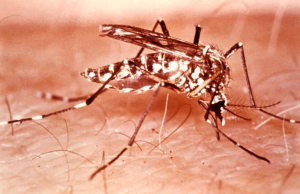By NewsDesk @infectiousdiseasenews
Although the trend is positively decreasing, notifications of suspicion of the disease continue to be registered throughout the national territory, the Paraguay Ministry of Health reports. This is the insist on the public not lowering their guard in the control and elimination of mosquito breeding sites, especially after the rains.

The Arbovirosis surveillance, in its weekly report, indicates that, in the last four weeks, 760 notifications of suspicious cases of Dengue were registered, equivalent to an average of 190 per week.
Citizens are urged to continue with the daily tasks of control and elimination of mosquito breeding sites in the home and work environment, as well as in recreational spaces. It is important to use a mosquito net to sleep and repellent during outdoor activities, as protection measures.
Likewise, it is requested to pay attention to the warning signs of the disease: high fever, abdominal pain or bleeding, signs that should alert you to the need for immediate medical consultation.
After the rains, it is essential to dispose of the accumulated water in containers, to maintain daily control in the homes and to eliminate potential mosquito breeding sites.
Those useless objects that cannot be disposed of, such as household appliances, tires or others, should be placed under a roof or covered, in order to avoid the accumulation of water, in addition, cover the tanks and drums that are used as a reservoir of water for consumption.
Changing the water in the animals’ drinking trough daily, after hygiene with a brush, soap and water, in order to eliminate possible eggs that have been attached to the walls of the container, is also a necessary action in the prevention of Dengue, Zika and Chikungunya.
According to the Pan American Health Organization, 11,255 total dengue cases have been reported in 2021 to date.
Brazil reports 1st confirmed diphtheria case in Mato Grosso state
Mucormycosis case reported in Formosa, Argentina
Panama reports 11 hantavirus cases year to date, one death
COVID-19 creates conditions for emergence of Candida auris in Brazil: Study


If I can write like you, then I would be very happy, but where is my luck like this, really people like you are an example for the world. You have written this comment with great beauty, I am really glad I thank you from my heart.